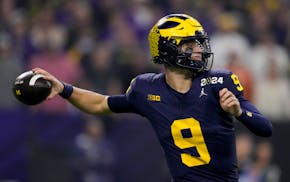TOKYO — The United States men's basketball team advanced to the Olympic quarterfinals on Tuesday in Tokyo by overcoming Ricky Rubio and Bam Adebayo.
Really.
Rubio, the newly former Timberwolf, played one of the best games of his life, shredding the U.S. defense for 38 points, four rebounds and two assists, keeping Spain in the game until the U.S. pulled away in the third quarter on the way to a 95-81 victory.
The U.S. will face Australia, which beat Argentina 97-59, in the semifinals on Thursday (Wednesday night at 11:15 p.m. in Minnesota).
Adebayo, who as the United States' starting center is emblematic of their lack of size and frontcourt depth in these Olympics, seemed to be the player holding back the U.S. offense for much of the game.
In the end, the U.S. followed an increasingly familiar script — offering lackluster defense and rebounding early, then responding with more energy and Kevin Durant's shooting to pull away.
But the story of the game was Rubio, whose lack of shooting accuracy has kept him from becoming a star in the NBA, but who is known for being a different player in international play.
On Tuesday, he was a different player than the Timberwolves ever knew. He hit 13 of 20 shots from the field and four of seven from three-point range. There was nothing fluky about his performance. He often earned his points against the stellar defense of American point guard Jrue Holiday, and wound his way through the U.S. defense for remarkably easy layups.
U.S. forward Draymond Green was asked if he expected that from Rubio. "Yes, because I watch all of the international tournaments," Green said. "He always plays like that, which is why he was the MVP of the World Championships and why he was the fourth or fifth pick in the draft or whatever."
Thanks for the reminder, Dray.
Rubio's perceived value was damaged by his high draft status (he was the fifth pick in the 2009 draft) and his spotty offensive play. He was drafted two picks ahead of Steph Curry by a disgraced Timberwolves front office, and at what might have been his high point in Minnesota, he tore up his knee in 2012.
"Ricky was outstanding," Spain guard Sergio Rodriguez said. "We're so happy to have him with us, so happy to see him enjoying this tournament."
Said Holiday: "I didn't expect anything less. Ever since he was like 12, he's been coming out here and playing like that."
Rubio debuted at the Beijing Olympics in 2008 at 17, handling the ball in the gold medal game against a dominant U.S. team. He became an international man of mystery. If he could play that well against NBA superstars at that age, what did his future hold?
The Timberwolves found out. They ended his second stint with the team by trading Rubio to Cleveland for forward Taurean Prince.
Should Timberwolves fans celebrate his international success or lament his relative NBA struggles?
It's all about expectations and standards. If Rubio had been the 25th pick in the draft, and had he returned to the Wolves while making less than $17 million, he could have been viewed as a savvy overachiever.
But that wasn't the case. Timberwolves fans could enjoy Rubio's passing, flair, defense and attitude, and praise his friendliness and accessibility to the fan base.
But if you care about winning, Rubio, by virtue of his draft position, remains symbolic of David Kahn's incompetence.
His injury makes him emblematic of terrible Timberwolves luck.
His return last year as a locker room leader demonstrated that made shots are more important than wise words.
Tuesday, Rubio did not stop in the press area for interviews, nor did he come to the formal postgame news conference.
USA coach Gregg Popovich offered an elevated form of praise to Rubio by comparing him to Durant, one of the best men's players in the world and at these Olympics.
Asked if Durant's scoring surges helped him relax on the sideline, Popovich said, "I'm not sure that it relaxes you, but you feel about him the way that the Spanish feel about Rubio. They're both great players. They're both hard to stop, obviously. But in these games, every team has people like that that they depend on to come through, and he certainly did."

Souhan: In 7 possessions, Wolves' defense reaches new level

Souhan: Wolves fans made Game 1 special. Now bring on Game 2.

Souhan: Should Vikings even consider McCarthy in NFL draft?

Souhan: NAW erases Suns' lead, Game 1 advantage with big performance


